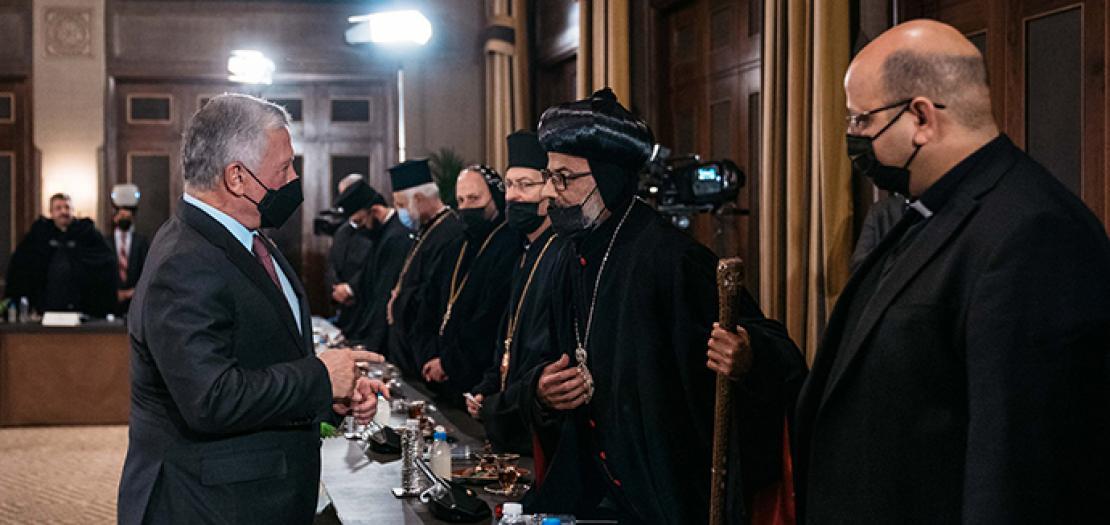Issued by the Catholic Center for Studies and Media - Jordan. Editor-in-chief Fr. Rif'at Bader - موقع أبونا abouna.org
The annual Royal meeting with the heads of Churches
The meeting between His Majesty the King and the heads of Churches in Jordan started in 1999 on the first Christmas celebrations during the onset of His Majesty King Abdullah II Ibn Al Hussein's assumption of his authorities. In the wake of this meeting, an official holiday was announced for all citizens without exception. It had earlier been the norm that only Christian employees and students attending public or private schools were to have the day off.
This meeting took place over the past years either in the Palace, or at the Baptism Site of Lord Jesus Christ, or even in some governorates where His Majesty would meet not only with the heads of Churches, but rather with representatives of various sectors of his countrymen, namely Muslims and Christians as has been the cases in Madaba, Fuheis, Husun, and Karak.
Today, after the 22nd meeting in a row, we find out that this meeting is a meeting of love, and an official conveyance of well wishes from the leader of the country to his extended Jordanian family on the advent of Christmas and the new year. Of course, this is a firm message that brothers do convey well wishes to their brethren, and so is the case with parents and children. It is not like the issue that was raised in intuitive discussions in the past years as whether it is permissible for us to convey well wishes to others who follow a different religion!
This annual meeting definitely indicates that things should be natural and innate, because the composition of the Jordanian society is uniform which includes respect for one another. We all remember during our childhoods how Muslims used to go to convey well wishes to their brethren and neighbors. Christians, led by parish priests also used to convey well wishes to their Muslim brethren.
In my childhood I recall going to the mosque in Wahadneh township to mark the Prophet's birthday. Consequently, we have to reinforce these values in our Jordanian society by exchanging well wishes despite the differences in faiths, and to fulfill these social duties that consolidate ties of love which we inherited from our parents and grandparents.
Secondly: This meeting serves as a message to the world, and a message to several countries that have a problem with common living and political tensions emanating from religious differences. Jordan's message is clear and explicit, namely it is the message of viewing religions as serving as a positive cooperation among the various segments of society regardless of their religious differences, or even within sectarian religions themselves. What is important is how to activate religious values in the service of cooperation in the search for solutions to humanity’s dilemmas, the most important of which is the health dilemma caused by the Corona virus.
Thirdly, this meeting has a special significance this year, as it takes place one day after the Council of Church leaders conveyed well wishes to its extended Jordanian family marking Jordan's centenary. This is the last meeting in the first centenary as we are now on the threshold of the second centenary with optimism and hope for a prosperous Jordan that is always continuing its journey like a ship anchored in the land of stability. We worked together during the first centenary so that Jordan would remain a symbol of affection, harmony, unity, and gathering. We want to continue this heritage towards a new centenary by preserving this trust with optimism, as well as with solidarity and unity designed to do goodness and to complete the construction process under the leadership of His Majesty the King and his Crown Prince for the best of Jordan and for the fulfillment of its message of harmony and faith.
Fourthly and lastly, this meeting that has taken place, brings together the Christians of Jordan and Palestine under the umbrella of the Hashemites. The coming of the heads of churches from Jerusalem, and the heads of Awqaf departments in Al Aqsa Mosque is a firm sign of the Hashemites' concern in the affairs of Jerusalem, its people, its holy places, and its daily affairs. The Hashemites have definitely a prominent role in defending the holy sites in noble Jerusalem, a matter which is accentuated in every Christmas meeting with the leader of the country. Happy New Year.
abouna.org@gmail.com
.







